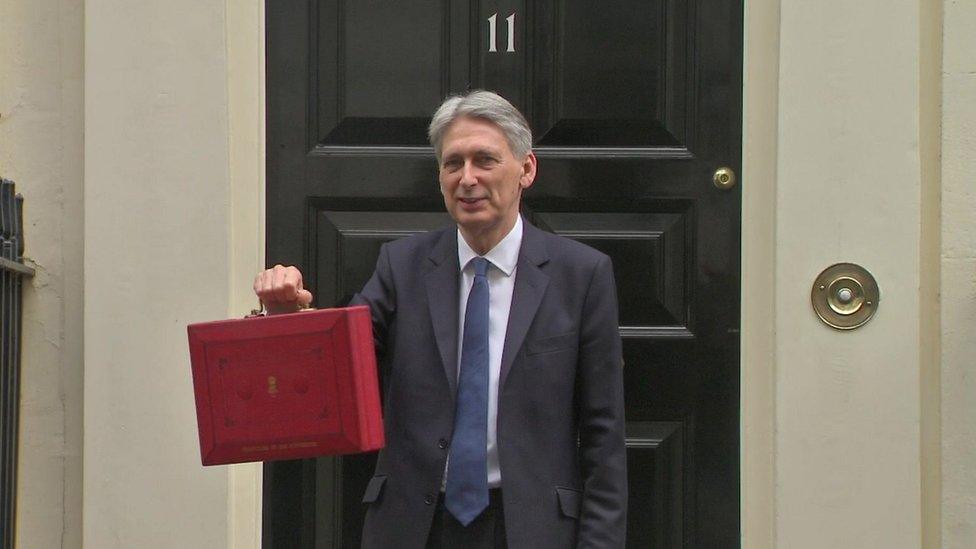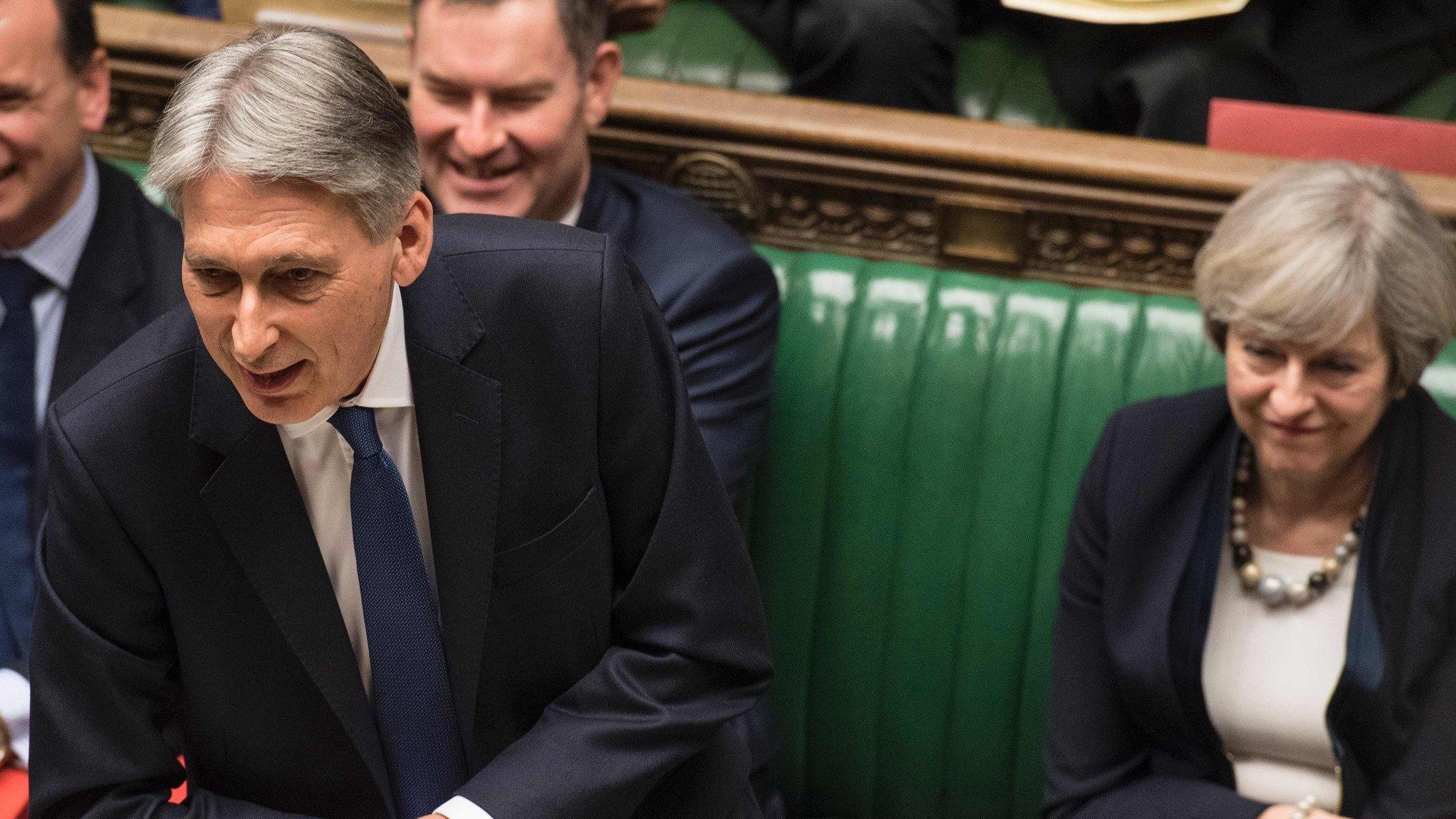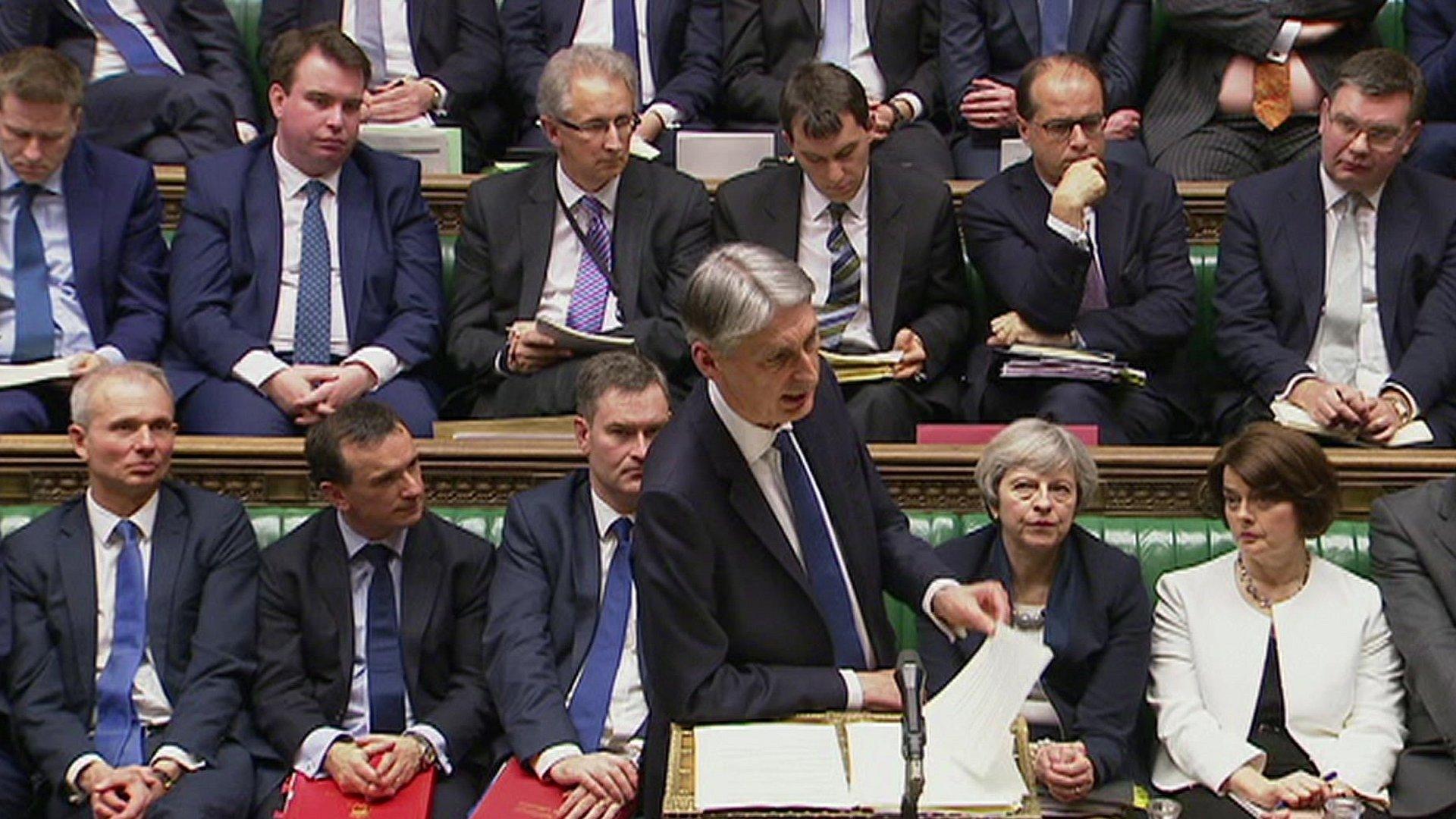Budget 2017: No clarity on funding, Welsh Government says
- Published
- comments

The chancellor's Budget gives no clarity on the future of Welsh Government finances, a senior minister has said.
Philip Hammond announced an extra £200m for Wales over four years.
Wales' Finance Secretary Mark Drakeford said it was still not clear how future UK spending cuts of £3.5bn would affect Welsh public services.
Welsh Secretary Alun Cairns said the Welsh Government had the "freedom to invest" extra cash in their priorities.
Mr Cairns also denied the Conservatives had broken a manifesto pledge not to increase National Insurance contributions by raising the rate of National Insurance paid by self-employed workers.
But Guto Bebb, a minister in his department, admitted on BBC Radio Cymru that it did break that promise.
"I believe we should apologise. I will apologise to every voter in Wales that read the Conservative manifesto in the 2015 election," he told Post Prynhawn.
Mr Hammond announced on Wednesday a cash injection of £2bn over three years to tackle problems in the social care sector in England - leading to extra cash for Wales under the Barnett funding formula.
As a result of that and other spending rises, Mr Hammond told MPs that the Welsh Government would get an extra £200m over four years - £150m over three years for day-to-day services and £50m over four years for infrastructure.
The Welsh Government's current annual budget is around £15bn.
The UK Government said it "continues to make good progress" towards a £1.3bn Swansea Bay regional "city deal" of investment funds and looked forward to considering proposals for north Wales.
Mr Cairns told BBC Wales that a city deal for Swansea was 'not ready'.
Mark Drakeford says the shadow of Brexit fell right across the Budget
Mr Drakeford said the Welsh Government cabinet would now decide where to spend the extra funds, but he was still concerned about plans for £3.5bn cuts to UK public spending in 2019-20.
"We still have no clarity about these looming cuts, which could result in our budget being reduced by £175m," he said.
"Since 2010, our budget has been cut by 8% in real terms. Today's Spring Budget was yet another missed opportunity to end austerity."
Mr Drakeford said despite budget pressures, the Welsh Government had prioritised funding for social care, and was offering £20m of additional help for small firms facing business rate hikes due to the recent revaluations.
He added that it was "disappointing" the chancellor did not use his Budget speech to confirm backing for the Swansea Bay region city deal, which he claimed was "ready to be signed".
£200m for Wales excellent says Alun Cairns
Welcoming the Budget, Mr Cairns said: "The people of Wales benefit from the stability of a strong UK economy while the £200m increase in funding gives the Welsh Government the freedom to invest in their priorities.
"Strong progress towards a City Deal for Swansea and a growth deal for North Wales will help ensure economic growth is shared across all parts of Wales, while the industrial strategy challenge fund and the new UK-wide 5G innovation network will equip Welsh businesses for the challenges of the future."
He told BBC Wales that he hoped the Welsh Government will spend extra funds from the Budget to help small businesses.
Mr Cairns said support for companies facing higher business rates in Wales was "half as generous" as the scheme offered in England.
The Welsh Government has said, however, that under its business rates relief scheme 50% pay nothing compared to 33% under Spring Budget plans in England.

What was in Spring Budget 2017?
Other than extra Welsh funding, the chancellor announced:
Class 4 National Insurance contributions for self-employed people to increase from current rate of 9% to 10% in April 2018, and 11% in April 2019
£2bn extra over three years to boost social care budgets in England
£435m for firms in England affected by increases in business rates, including £300m hardship fund for worst hit
Cigarettes up 35p for a packet of 20, beer up 2p a pint, cider 1p, whiskey 36p a bottle, still wine 10p
No changes on fuel duty announced
Growth forecast for 2017 upgraded from 1.4% to 2%
Annual borrowing of £51.7bn in 2016-17, £16.4bn lower than forecast

Plaid Cymru Treasury spokesman, Jonathan Edwards MP, said it was a "high tax, low wage budget".
"Taxes are at their highest in a generation and wages are still falling," he said.
UKIP assembly group leader Neil Hamilton claimed the chancellor had declared a "war on jobs" by increasing National Insurance contributions for the self-employed.
"The chancellor should be wielding the axe over the £12bn foreign aid budget. Instead he is hammering the very people who are at the centre of our economic growth," he said.
Welsh Liberal Democrat leader Mark Williams said: "What we've heard today is window dressing from a government that's turned to managing the economic damage Brexit will cause."
He described the extra money for Wales as a "sticking plaster".
Meanwhile council leaders in Wales have said the budget "could have gone further to reverse austerity", warning that most of their discretionary services had been "hollowed out".
The Welsh Local Government Association (WLGA) was keen to see a boost to social care funding as in England, warning of a £92m budget shortfall in Wales.
Flintshire council leader Aaron Shotton, WLGA spokesman on finance, said councils had "worked well with the Welsh Government to ensure that the English social care funding crisis is not replicated here".
"However, the service is now creaking and we are only two years away from a similar crisis," he added.
"What we really need is a long-term solution to the problems posed by an ageing population with more chronic conditions."
- Published8 March 2017

- Published8 March 2017

- Published8 March 2017

- Published8 February 2017
